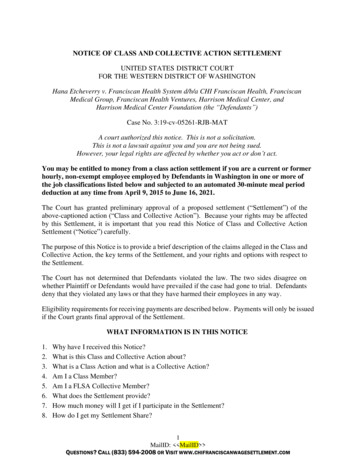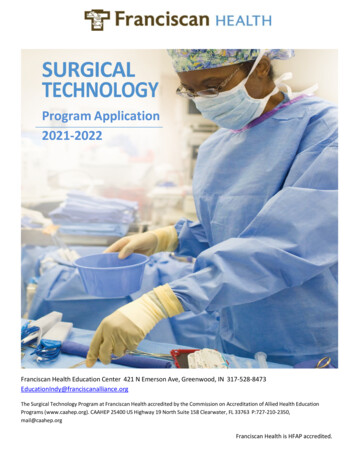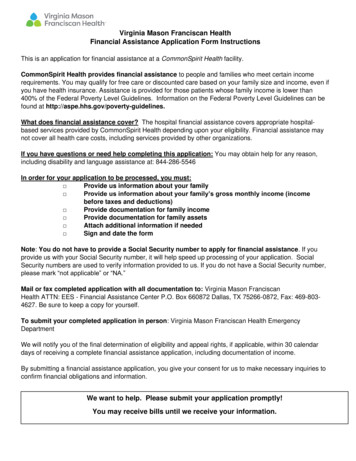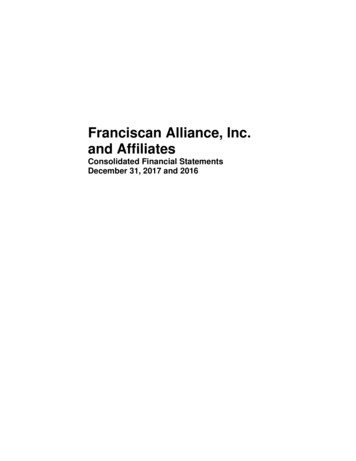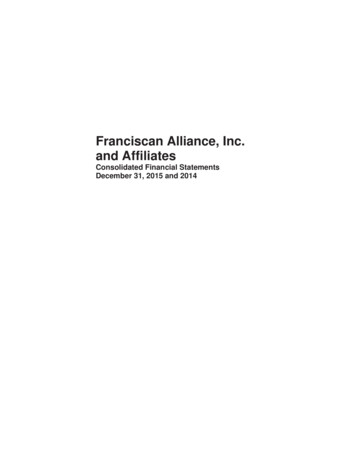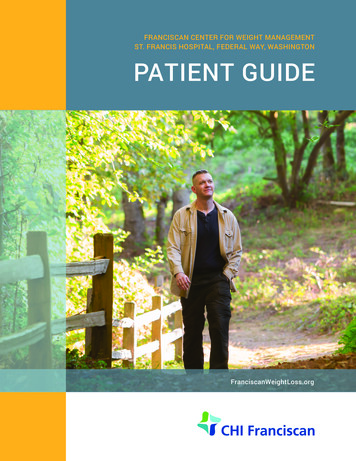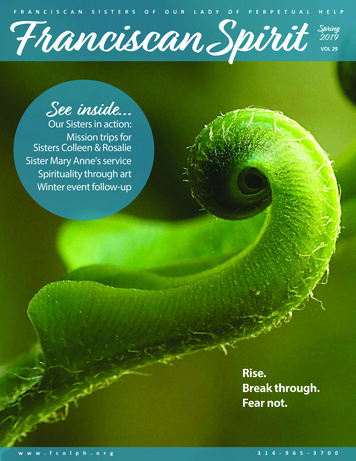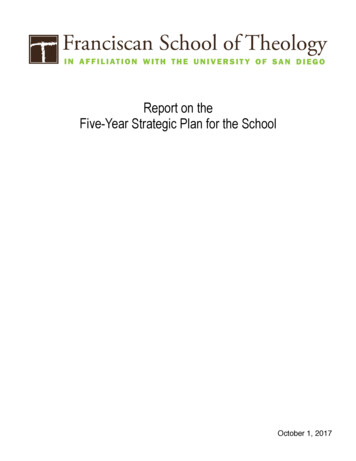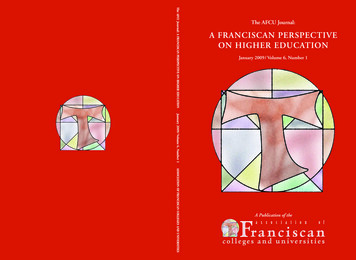
Transcription
A FRANCISCAN PERSPECTIVEON HIGHER EDUCATIONJanuary 2009/ Volume 6, Number 1The AFCU Journal: A FRANCISCAN PERSPECTIVE ON HIGHER EDUCATIONThe AFCU Journal:January 2009/ Volume 6, Number 1ASSOCIATION OF FRANCISCAN COLLEGES AND UNIVERSITIESA Publication of the
Board of DirectorsSr. M. Elise Kriss, OSF, Chair Dr. Thomas FlynnUniversity of Saint FrancisAlvernia CollegeFort Wayne, INReading, PADr. Robert Helmer, Vice Chair Dr. Rosalie MirendaLourdes CollegeNeumann CollegeSylvania, OHAston, PASr. Margaret Carney, OSFSt. Bonaventure UniversitySt. Bonaventure, NYSr. Gabrielle Kowalski, OSFExecutive DirectorCardinal Stritch UniversityMilwaukee, WIAFCU MEMBER INSTITUTIONSAlvernia UniversityReading, PAwww.alvernia.eduMadonna UniversityLivonia, MIwww.madonna.eduSt. Francis CollegeBrooklyn Heights, NYwww.stfranciscollege.eduCardinal Stritch UniversityMilwaukee, WIwww.stritch.eduMarian CollegeIndianapolis, INwww.marian.eduSiena CollegeLoudonville, NYwww.siena.eduFelician CollegeLodi, NJwww.felician.eduNeumann CollegeAston, PAwww.neumann.eduSilver Lake CollegeManitowoc, WIwww.sl.eduFranciscan Schoolof TheologyBerkeley, CAwww.fst.eduOur Lady of theLake CollegeBaton Rouge, LAwww.ololcollege.eduUniversity of Saint FrancisFort Wayne, INwww.sf.eduFranciscan Universityof SteubenvilleSteubenville, OHwww.franciscan.eduQuincy UniversityQuincy, ILwww.quincy.eduHilbert CollegeHamburg, NYwww.hilbert.eduLourdes CollegeSylvania, OHwww.lourdes.eduSaint Francis UniversityLoretto, PAwww.francis.eduSt. Bonaventure UniversitySt. Bonaventure, NYwww.sbu.eduUniversity of St. FrancisJoliet, ILwww.stfrancis.eduVilla Maria CollegeBuffalo, NYwww.villa.eduViterbo UniversityLaCrosse, WIwww.viterbo.eduThe AFCU Journal: A Franciscan Perspective on Higher Education is publishedannually by the Association of Franciscan Colleges and Universities. Each member institution receives five copies of the journal. Non-members may subscribe to the Journal for an annual rate of 10. Additional copies of the journal may be purchased by members and non-members at the following rate:1–49 copies 4.50/copy plus postage50–99 copies 4.00/copy plus postage100 or more copies 3.50/copy plus postageThe AFCU Journal:A Franciscan Perspective on Higher EducationHistory and MissionOn October 3, 2001, the Board of Directors of the Association of FranciscanColleges and Universities approved a proposal for an annual journal to featurethe peer reviewed research and writings of faculty and administrators of theirinstitutions. The purposes of the AFCU journal are: To strengthen the vision of Catholic higher education in theFranciscan tradition T o connect all the discrete disciplines to a Franciscan philosophyand heritage To encourage an interdisciplinary and multidisciplinary approachto research and reflection from the Franciscan school of today To provide motivation for reflection on the breadth and depth ofscholarship emanating from Franciscan institutions of higher learning.It is hoped that this publication will offer an incentive for faculty and staff toreflect upon the distinct character of a Franciscan institution of higher education.The publication of the journal is guided by a small editorial board and assistedby contact persons within each of the AFCU institutions. The views expressedin the articles are attributed to the authors and not to the member institutions.Permission to reprint articles should be directed to: Editor, The AFCU Journal,Neumann College, One Neumann Drive, Aston, PA 19014.Editorial Board: Sr. Felicity Dorsett, St. Louis University (student) and Universityof Saint Francis, Fort Wayne, IN; Kevin Godfrey, Alvernia University; AnthonyMurphy, St. Bonaventure University; Barbara Wuest, Cardinal Stritch University(former faculty); Sr. Patricia Smith, Staff to Editorial Board, Neumann College;Sr. Patricia Hutchison, Chair, Neumann College.Poetry Editor: Murray Bodo, OFM with the assistance of Barbara Wuest.Book Review Editor: Kevin GodfreyAssistance with this issue was provided by the following personnel: Sr. PatriciaSmith, OSF and Sr. Margaret Oman, OSF (Neumann College) and Sr. BarbaraReynolds, SDS (Cardinal Stritch University).Submission of ManuscriptsFaculty, staff, and administrators from AFCU institutions and related organizationsare invited to submit articles related to the Franciscan perspective on higher education. Articles should be approximately 3,000 to 7,000 words in length. Shorterarticles describing unique programs and “best practices,” book reviews, andoriginal poems are also welcome. When citing Franciscan sources, please consultFrancis of Assisi: Early Documents. For specific directions for preparation andtransmittal of manuscripts, please contact: Editor, The AFCU Journal, NeumannCollege, One Neumann Drive, Aston, PA 19014 or hutchisp@neumann.edu. Articlesand poems will be reviewed and selected by the AFCU editorial board.
The AFCU Journal:A F r a n c i s ca n P e r s p e ct i v eo n H i g h e r E d ucat i o nJanuary 2009/ Volume 6, Number 1A Publication of the
The AFCU Journal:A F r a n c i s ca n P e r s p e ct i v eo n H i g h e r E d ucat i o nJanuary 2009 Volume 6, Number 1ContentsFrom the AFCU Board Chair. . . . . . . . . . . . . . . . . . . . . . . . . . . . . . . . . . . . . . . . . . viFrom the AFCU Journal Editor . . . . . . . . . . . . . . . . . . . . . . . . . . . . . . . . . . . . . . . viiAFCU Symposium SectionKeynote and Plenary PresentationsThe Franciscan Spirit in Catholic Higher Education . . . . . . . . . . . . . . . . . . . . 1J. A. Wayne Hellmann, OFM Conv., Ph.D.Can Ethics Be Taught?Harvard’s Question, Scotus’s Ethics, andTwenty-first Century College Students . . . . . . . . . . . . . . . . . . . . . . . . . . . . . . 12F. Edward Coughlin, OFM, Ph.D.Character Formation: Educating for Ethical LivingA Response to Can Ethics Be Taught?. . . . . . . . . . . . . . . . . . . . . . . . . . . . . . . . 24Gerald S. Vigna, Ph.D.The Vocabulary of Franciscan Leaders:What’s in a Word?. . . . . . . . . . . . . . . . . . . . . . . . . . . . . . . . . . . . . . . . . . . . . . . . 27Roberta A. McKelvie, OSF, Ph.D.Cover: AFCU logo created by Sherry Rudzitis ’01under the direction of Peter Galante, Cardinal Stritch UniversityCover design by Sharon Halama,Graphic Design Major, Cardinal Stritch UniversityDesigned and printed by Valley Press, Inc., Bala Cynwyd, Pennsylvania 2009 Association of Franciscan Colleges and Universities (AFCU)All rights reserved. For permission to reprint, contact the Editor.Living the Franciscan Tradition throughthe Writings of Saint Francis:An Interview with William R. Cook, Gary W. Towsley,Ronald B. Herzman, and Weston L. Kennison. . . . . . . . . . . . . . . . . . . . . . . . . 36Patricia Smith, OSF, JCD, Ph.D. andPatricia Hutchison, OSF, Ed.D.Presentation PapersFranciscan Themes in Leadership Philosophy:Power Based Leadership and Service Based Leadership. . . . . . . . . . . . . . . 42Bongrae Seok, Ph.D.Mathematics: When Hospitality, Courtesy and GratitudeEnter the Equation. . . . . . . . . . . . . . . . . . . . . . . . . . . . . . . . . . . . . . . . . . . . . . . 52Fred Savitz, Ed.D. and Ryan Savitz, Ph.D.iii
Teaching Women’s Health Care to Nursing Studentsfrom a Pro-Life Catholic Perspective . . . . . . . . . . . . . . . . . . . . . . . . . . . . . . . . 66Mary Ellen Symanski, Ph.D., RNSport as a Socializing Agent and Unifier of People:How to Foster and Reinforce Franciscan Values through Sport. . . . . . . . . 113Travis A. BergerMission: Sharing in the Grace —Sharing in the Responsibility . . . . . . . . . . . . . . . . . . . . . . . . . . . . . . . . . . . . . . 76Mary Bumbolow, Shannon O’Neill, Ph.D.Kenneth Paulli, OFM, Ed.D. and Keith VolskyA Franciscan View of Sport:Ministering to the Student Athlete. . . . . . . . . . . . . . . . . . . . . . . . . . . . . . . . . 114Ed Hastings, Stephanie Taylor, and Sr. Marguerite O’Beirne, OSFPreserving the Dignity and Worth of the Individual:A Faith-based Approach forWorking with Indigenous People . . . . . . . . . . . . . . . . . . . . . . . . . . . . . . . . . . . 86Paula J. Scraba, Ph.D., CAPEIntegration of the Values of St. Francis and St. Clareinto the Classroom and the Profession of Care . . . . . . . . . . . . . . . . . . . . . . . 96Dorothea Epple, Ph.D.Micheal Weuste, Ph.D.Successful Integration of Franciscan Values inBusiness Curriculum: A Case Study. . . . . . . . . . . . . . . . . . . . . . . . . . . . . . . . 107Raj Devasagayam, Ph.D.Breakout Presentation SummariesAssessing Outcomes of a Franciscan Education:Some Preliminary Findings and Suggestions of What Works. . . . . . . . . . . 112Neil PennyFranciscanism and the Institutionalization of Service Learning . . . . . . . . 112Mary SacavageLearning and Serving in the Real Worldof Community Health Nursing . . . . . . . . . . . . . . . . . . . . . . . . . . . . . . . . . . . . 112Kathleen Wisser and Connie TwymanProviding a Continuum of Service-Learning Experiences. . . . . . . . . . . . . . 113Mary Kay Solon, Diane Martin, Andrew Prall, and Ann HernandezOpening D.O.R.S. through Experiential Learning. . . . . . . . . . . . . . . . . . . . . 113Jennifer FraleyEthical Responsibilities of Franciscan Educatorstoward Environmental Issues. . . . . . . . . . . . . . . . . . . . . . . . . . . . . . . . . . . . . 113Elaine Grose, Janet Massey, Anne Ramirez,Randy Detra and Mac GivenivIntegrating Franciscan Charism intoSelected Philosophy and Religious Studies Courses. . . . . . . . . . . . . . . . . . 114Donald J. MonninA Unique Franciscan University-Italy Relationshipfor the advancement of Leadership, Learning and Service. . . . . . . . . . . . . . . . 115Kristine Hipp, Teri Wagner,Angelo Vasta and Rossella VastaPoemThis World. . . . . . . . . . . . . . . . . . . . . . . . . . . . . . . . . . . . . . . . . . . . . . . . . . . . . . . . 119Terence GleesonInvited Contribution ranciscan Colleges and Universities and theFFranciscan Action Network — Together, Transformingthe World in the Spirit of St. Francis and St. Clare. . . . . . . . . . . . . . . . . . . . . . . 124Russell M. Testa and the FAN StaffBook ReviewsFranciscans at PrayerTimothy J. Johnson, Ed. . . . . . . . . . . . . . . . . . . . . . . . . . . . . . . . . . . . . . . . . . . . . 133Marian Maskulak, CPSCare for Creation [a franciscan spirituality of the earth]Ilia Delio, Keith Warner, and Pamela Wood. . . . . . . . . . . . . . . . . . . . . . . . . . . . . 137Elaine GroseThe Franciscan Vision and the Gospel of JohnMichael D. Guinan, OFM. . . . . . . . . . . . . . . . . . . . . . . . . . . . . . . . . . . . . . . . . . . . . 138Eileen FlanaganMeet Our Contributors . . . . . . . . . . . . . . . . . . . . . . . . . . . . . . . . . . . . . . . . . . . . 142v
From the ChairFrom the EditorDear friends in Franciscan higher education,More than 240 administrators, faculty members, sponsors, and trusteesrepresenting 19 Franciscan colleges and universities gathered at AlverniaUniversity in Reading, PA, from June 5 to 7, 2008, to reflect on their commonidentity as Catholic institutions in the Franciscan tradition. The theme ofthe symposium was Franciscan Education: Developing Leadership; BuildingCharacter; Improving Student Learning beyond the Lecture Halls. In this,our sixth issue of The AFCU Journal: A Franciscan Perspective on HigherEducation, we have tried to provide a “taste” of the symposium. Our hopeis that you will be encouraged to renew and deepen leadership, character,and student learning within your own institutions so that the Franciscantradition and spirit will continue to touch the minds and hearts of ourstudents and all who minister in our colleges and universities.It is my honor to introduce the 2009 AFCU Journal. My sincere thanks toall of the authors who have contributed their precious time and rich talentto bring to life this year’s issue. It is our hope that the materials sharedhere will be useful to many and will serve to inspire all of you to furtherthe great work being done at all of the Franciscan colleges and universitiesacross the country. Each member of the communities of our colleges anduniversities is needed to bring the Catholic Franciscan tradition to ourstudents and to our world.Many of you were privileged to attend the 2008 AFCU Symposium atAlvernia University this past June. We are pleased to include in this issuethe text of the keynote and plenary addresses at the Symposium as wellas short takes on several of the breakout sessions. You will also find aspecial treat, a poem from a presentation at the Symposium inspired bythe Canticle of the Creatures. For those of you who did not attend theSymposium, we trust that you will enjoy reading these items; for those ofyou who were in attendance, you will enjoy this opportunity to revisit theSymposium.You will also discover a very fine article by Russell Testa, Director ofFranciscan Action Network (FAN); we specifically requested an article onFAN for inclusion in this issue, as well as book reviews on Franciscans atPrayer (ed. Johnson), Care for Creation (Delio, Warner, Wood), and TheFranciscan Vision and the Gospel of John (Guinan).It is my personal hope that you will make good use on your respectivecampuses of the rich contents of this journal. At the University of SaintFrancis we provide copies to various groups including our academicdepartments and Board of Trustees. We encourage our faculty members toread and discuss the journal’s contents, and also to use it to inform theirteaching in their various disciplines. We also make it a point to encourageour faculty members to submit articles for publication, which I hope isalso done at other AFCU institutions.I hope to see many of you at the AFCU annual meeting in Washington,D.C. on January 31. In the meantime, I would like to take this opportunityto extend my wishes for a new year filled with many opportunities for thevibrant expression of our Catholic Franciscan tradition.Sister M. Elise Kriss, OSFChair, AFCU Board of DirectorsPresident, University of Saint Francis, INviWayne Hellmann, OFM Conv., chair of the Theology Department atSt. Louis University, delivered the keynote presentation on Thursdayevening, June 5. In his presentation, Retrieving and Exploring the Catholicand Franciscan Intellectual Tradition, Father Hellmann reflected on thethree dimensions of Catholic higher education which Pope Benedict XVIemphasized in his address to educators during his visit to the UnitedStates in April 2008. Specifically, Father Hellmann provided a deeperinsight into these themes (i.e., the communal nature of higher education,the transcendent nature of the human person, and participation in thepublic forum) in the context of the Franciscan tradition.Three plenary sessions served as anchors for the symposium onFriday and Saturday. Margaret Carney, OSF, president of St. BonaventureUniversity, addressed the topic Character Formation: Education for EthicalLiving. In her opening remarks, Sr. Margaret acknowledged the contributionof Brother Ed Coughlin, OFM in developing the presentation which exploredthe university’s role in fostering the development of ethical women andmen and the challenges that delivering on this promise presents. We aregrateful to Brother Ed for providing the article for this journal. Gerald S.Vigna, Ph.D., founding director of the Alvernia University Center for Ethicsand Leadership, responded to Sr. Margaret’s presentation.In the second plenary session Roberta Agnes McKelvie, OSF, a memberof the leadership team of the Bernardine Franciscan Sisters, addressed thetopic Leadership in a Franciscan Key. Asserting that Franciscan leadershipshould be different from “secular” leadership, Sr. Roberta discussed thevocabulary of Franciscan leaders, the characteristics of Francis and Clareas leaders, and core elements that leaders at every level in Franciscaninstitutions should understand and embrace.vii
The third plenary session featured four members of the faculty ofthe State University of New York at Geneseo. William R. Cook, Ph.D.,Distinguished Professor of History; Gary W. Towsley, Ph.D., DistinguishedTeaching Professor of Mathematics; Ronald B. Herzman, Ph.D.,Distinguished Teaching Professor of English; and Weston L. Kennison, MA,Lecturer of English and Humanities addressed the challenge and possibilityof Living the Franciscan Tradition through the Writings of Saint Francis. Thesefour colleagues shared the insights they have gained and the applicationsthey have made in their respective disciplines through their study andresearch of medieval history, literature, philosophy, theology, politics,and science. They offered practical ways of integrating the Franciscantradition into every aspect of the liberal arts curriculum. In preparationfor this issue of the journal, Sr. Pat Smith and I interviewed the “quartet”from SUNY Geneseo. I am grateful to Pat for preparing the interview whichbrings to life their dynamic spirit shared at the symposium.Following each plenary session conference participants had theopportunity to attend a breakout session in an area of interest. More than100 conference participants from Franciscan colleges and universitiespresented more than 30 breakout sessions related to fostering theFranciscan tradition in every aspect of campus life and the curriculum.Topics ranged from the arts to math; business to nursing; servicelearning to sports; the Assisi pilgrimage to Franciscan publications; FirstYear Experience programs to leadership retreats; mission awareness toassessment; and more. In response to our call for papers for the journal,we received several articles. We have included a representative sample inthis issue.Exploring two different types of leadership, power based and servicebased, Bongrae Seok of Alvernia University discusses the Franciscan idealsof service and humility. Dr. Mary Ellen Symanski from Alvernia Universityshares the opportunities and challenges encountered by nursing facultywho attempt to encourage a Catholic Franciscan focus on reverence forlife when teaching reproductive issues. Some readers may be surprisedto find that students in introductory math classes may actually performbetter when the educational theories of Dewey, Piaget, Bloom, and Gardnercombine with the Franciscan values of hospitality, courtesy, and gratitude.This was the finding of a study conducted by father-son team Fred andRyan Savitz from Neumann College.In the article “Mission: Sharing in the Grace — Sharing in theResponsibility,” Kenneth Paulli, OFM, Shannon O’Neill, and Keith Volskyrecount efforts to bring the identity and mission of Siena College to lifeacross the campus. The testimony of recent graduate Mary Bumbolowviiiprovides strong affirmation supporting the impact of their efforts. Dr.Paula Scraba’s efforts to integrate Franciscan spirituality, Native Americanspirituality, and the spirituality of sport also seem to have transformedstudents in a special service-learning project for pre-service teachers atSt. Bonaventure University.At the University of St. Francis in Joliet, Illinois, Dorothea Epple andMicheal Weuste have incorporated the stories of Francis and Clare of Assisiinto learning modules for a graduate program in social work. Their effortsto encourage their students to relate the Franciscan stories with their ownlife experiences can be adapted easily to other professional programs.Similarly, Dr. Raj Devasagayam describes attempts at Siena College toinfuse Franciscan values into finance, English, and marketing. He thenrelates the impact on students and community partners from students’attempt to design marketing strategies which support persons who areoften marginalized.Following the articles are summaries of several breakout sessions.These breakout summaries may encourage additional sharing andcollaboration in the initiatives described. We are grateful to all theauthors who have provided their contact information. Due to thenumber of breakout sessions, it was impossible to include every articlesubmitted. We encourage readers to explore the re-designed websiteof the Association of Franciscan Colleges and Universities whereseveral additional papers and Power Point presentations are s.org/symposia/2008.html).The poem included in this issue “This World” was inspired by theCanticle of Creation. Author Terence Gleeson of Neumann College includesan introduction explaining the evolution of the poem and its inclusion in atheater production. To learn more about the theater production Canticles,visit the AFCU website.In March 2007, friars, sisters, secular and ecumenical Franciscansgathered to create an organization called Franciscan Action Network(FAN) to encourage the larger U.S. Franciscan Family to “speak with oneFranciscan Voice in order to effect the transformation of national socialpolicy.” The gathering represented the largest Franciscan group everassembled in the U.S. to discuss ways to be better advocates with personswho are poor, marginalized, or victims of injustice. Over the past 18 monthsFranciscan Action Network has developed a staff, a website, and a numberof resources related to care for creation, peacemaking, poverty, and humanrights. Desiring to promote the hope of the staff of FAN to collaborate withFranciscan colleges and universities, the editorial board of the journalix
invited executive director Russ Testa to describe FAN for our readers. Wehope that after you read the article, you will take some time to visit theFAN website and join the network.As always, we share book reviews related to Franciscan topics. Sr.Marian Maskulak, formerly of Alvernia University, provides a review ofFranciscans at Prayer. Dr. Elaine Grose and Dr. Eileen Flanagan, both ofNeumann College, provide commentaries on Care for Creation and TheFranciscan Vision and the Gospel of John. We hope that you will be inspiredto read and use these resources.The 2008 symposium was the third conference organized and sponsoredby the Association of Franciscan Colleges and Universities. The firstconference took place in 2004 at Cardinal Stritch University in Milwaukee,WI. St. Bonaventure University hosted the second conference in 2006. TheFranciscan colleges and universities of the Midwest will co-host the 2010AFCU Symposium at the University of Saint Francis, Fort Wayne, IN, fromJune 8 – 11, 2010. Perhaps this issue of the journal will encourage readersto make plans now to attend!We encourage you to read and discuss the articles included in thisissue. We invite your response to the articles. We hope that you will alsoconsider contributing to a future issue of the journal.Patricia Hutchison, OSFChair, Editorial BoardThe Franciscan Spirit in Catholic Higher EducationJ. A. WAYNE HELLMANN, OFM CONV., Ph.D.St. Louis University St. Louis, MOhellmann@slu.eduIntroductionEarlier this spring, as I began to reflect on what I might share at thisAFCU symposium, several themes began to emerge. I was thinkingabout Bonaventure’s theology of the Word: how the Word establishes and forms our shared relationships, identifies who we are, ordersus beyond ourselves to the Other, and thereby connects us to the wholeworld of creation.Then, Pope Benedict came and stole my thunder. I should not havebeen surprised! Intellectually and spiritually formed in the theology of St.Bonaventure, the Pope emphasized themes that deeply resonated withme, themes I wanted to share in this address. How refreshing! Over thelast 100 years, Catholic education has been dominated by Leo XIII andhis Thomistic program outlined in Aeterni Patris. Benedict went beyondthe approach of Leo. The thought of St.Thomas has been our tried and true path,The value of faith givesbut that now changes. Furthermore, despiteform and contextualizes the expectation and anticipated glee of afew bishops, Benedict did not even mentionthe whole communalEx Corde Ecclesiae. Rather in his address toexperience of education.post secondary Catholic educators at theCatholic University of America, he left recentpolemic behind and drew from the much richer Augustinian/Franciscantradition. He charted new waters! We should not miss this opportunity.Three Aspects of Catholic Higher EducationThis evening I want to highlight just three themes the pope emphasized. Significantly, these three dimensions are rooted in the Franciscantradition. In Part One of my address, I will list the three points Benedictemphasized, points found in nearly every other address he delivered on USsoil. What did he say? Then, I will contextualize how the pope understandsthese three points and how he used them in other addresses he deliveredduring his visit to the United States. How does he apply these three pointselsewhere? We will see a basic unity. Pope Benedict is remarkably consistent. In Part Two, I will bring our particular Franciscan specificity to bearon these three themes and, thereby provide, from my perspective, deeperFranciscan insight into the three points the pope made and applied. Thethree aspects of which I speak are: community, the human person, and thepublic forum.x
Part OneThe Message of Pope Benedict XVI in the United States April 2008First, Pope Benedict proclaimed the importance of the communalnature of Catholic higher education, the importance of the community.What did he say? In his address to Catholic educators on April 17, 2008Benedict emphasized that “(education) involves the entire Christian community.” He added, “the dynamic of communal identity — to whom do Ibelong — vivifies the ethos of our Catholic institutions.” He went on to saythat Catholic education is “to be described as a move from the ‘I’ to the‘we,’ leading the individual to be numbered among God’s people.” Thiscommunal nature is expressed “liturgically, sacramentally, through prayer,acts of charity, a concern for justice and respect for God’s creation.” Thevalue of faith gives form and contextualizes the whole communal experience of education. Faith, in the words of Pope Benedict, “must shape allaspects of an institution’s life, both inside and outside the classroom.” Inthese and other reflections, the pope continually emphasized that Catholiceducation is the experience of a wholly integrated faith community. Thisforms the basis for two other points.Secondly, Benedict emphasized “the essential transcendent dimensionof the human person.” This was perhaps at the heart of his message, hereand everywhere. He explained: “If nothing beyond the individual is recognized, the ultimate criterion of judgment becomes the self and the satisfaction of the individual’s immediate wishes.” “This,” he said, “promotes alowering of standards, a timidity in the face of the category of the good.”The “transcendent dimension of the human person” is foundational forthe formation of community and is a key to “liberate the young from thelimits of positivism.” Only liberation for the transcendent opens ways forstudents to pursue the big questions about the mystery of life.Finally and thirdly, Pope Benedict focused on the public forum.Benedict indicated that Catholic education should help “keep the publicdebate rational, honest, and accountable.” In other words, Catholic education must prepare students to take their voice in debates of the publicforum so that they might help shape it rather than simply be manipulatedby it.Thus, the academic enterprise must encourage, “the pursuit of truth,good, and beauty.” This pursuit focuses on the transcendent nature of thehuman person and forms thereby the basis and reason for the formationof the Catholic academic community. In turn, this “pursuit of truth, good,and beauty” makes possible a much larger contribution.At its best, Catholic education must be a leaven in the broader world,a light set on a hill. Pope Benedict explicitly stated that any attempt to“privatize” religion must be resisted. Every aspect of our lives, includingour religious experience and vision, has public consequences. Studentsmust not be silenced. Rather they must be helped to understand and give clear voice, creatively and courageously, to the Catholic sacramentalvision of reality: all creation, including the public forum is sacred.Pope Benedict’s Application of These Three AspectsNow, let me address these same three points again, this time within thebroader context of Benedict’s other addresses. How did he apply thesethree principles? Like a master teacher he demonstrated how these threepoints (community, human transcendence, and public forum) are to beapplied in the broader experience of the human endeavor. Benedict rejected an isolated ivory tower understanding of academic life. Everything wedo, including education, must be orientated to the common good of thewhole human endeavor and to the hopes of the global human community.The importance of communityI draw on three practical examples and demonstrate how PopeBenedict applied this educational principle of community to the broaderhuman context. First, speaking at the White House on April 16, 2008, heshared that in his address to the United Nations he intended to encourage representatives of the nations in theirefforts to make that institution a voice forWe are social beingsthe “aspirations of all the world’s peoples.”who find fulfillmentHe further underlined that “global solidarityis urgent if brothers and sisters dwellonly in love —ing in the same house” are to sit togetherfor God and neighbor.around “that table which God has set for allhis children.” In his address at the UnitedNations on April 18, 2008, the pope lamented that, even in an institutionwhich values universal objectives, “multilateral consensus continues tobe in crisis because it is still subordinated to the decisions of a few.”Secondly, in a totally different manner, Benedict accented the samepoint about the centrality of community when, at the National Shrineof the Immaculate Conception on April 16, 2008, he cautioned bishopsagainst forms of piety which sometimes emp
to research and reflection from the Franciscan school of today . Loretto, PA www.francis.edu St. Bonaventure University St. Bonaventure, NY www.sbu.edu St. Francis College Brooklyn Heights, NY www.stfranciscollege.edu Siena College Loudonville, NY www.siena.edu Silver Lake College Manitowoc, WI www.sl.edu University of Saint Francis Fort .
